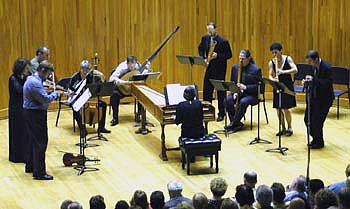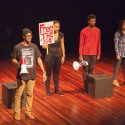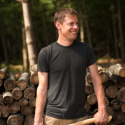Sounds of early music to fill Madison air
Sackbut, shawm, lute, viola de gamba or crumhorn, anyone?
These are just a few early ancestors of some modern musical instruments we know today. But instead of being closeted away in a musty museum, these instruments are still played by enthusiasts of early music. Those enthusiasts will get a chance to study with virtuosos of those instruments and early music vocal masters and perform period music at the Madison Early Music Festival (MEMF), to be held on campus July 11-18.
The opportunity to study, attend concerts and perform in concerts sets the Madison festival apart from most other early music fests, says Paul Rowe, professor with the UW–Madison School of Music and co-artistic director of MEMF with his wife, Cheryl Bensman-Rowe. “Some festivals have no educational component at all and some are all workshops. MEMF is a blend that encourages mixing and meeting new people,” says Rowe.
MEMF celebrates its 10th season this year, so the festival format seems to be a winner. Some 100-120 attendees from around the country, of all ages, are drawn to the opportunity to work with world-class faculty who are stars in their fields. Their days are packed, with classes, workshops and rehearsals under way at 8:30 a.m.; the lights don’t go out until long after the applause dies away at the evening concerts.
Chelcy Bowles, professor with UW–Madison’s Division of Continuing Studies and festival program director, says, “This is not a conference just for scholars and professional musicians; we have amateurs, enthusiasts, advanced players and those on the verge of becoming professionals. We want everyone to enjoy this festival at whatever level. For the audience, they can just sit and listen, hearing world-class musicians make beautiful music.”
Early music may not be as popular or well-known as music from other periods, but once heard, it is often embraced — the melodies, lyrics and emotion are hard to resist. Case in point: Sting, former frontman for the band The Police, was given a lute. Smitten with the instrument, he studied up, eventually releasing an album of Elizabethan lute music and songs.
Period instruments have a different sound quality and much early music was heard casually in small spaces: homes, court and church. “Instruments really started to change around 1800, and they had a louder, brighter sound, giving rise to bigger and bigger concert halls and new compositions for the new instruments,” says Rowe.
Rowe and Bowles say some early music is also noted for being improvisational, with repeating bass lines and melodies on top that can go anywhere. “There are not as many musical rules to follow and the music can sound quite contemporary rhythmically and harmonically,” says Bowles. “Sometimes you don’t know what the music is going to do. That’s what makes it so fun to play and listen to.”
But the festival is not just for the attendees; seven public concerts and eight free lectures are planned. Much of the programming was selected to celebrate the International Year of Astronomy, which marks the 400th anniversary of the first use of Galileo’s telescope. Music from around Galileo’s time, 1580-1620, will explore the connections between science and music. “Harmony of the Spheres: A Celebration of Celestial Inspiration”; “Stile Moderno: The New Science of Music from the 17th Century”; and “Celestial Seasonings” are just a few of the concert titles. Lectures will delve into Galileo’s world — society, politics, science and culture — to give people a better understanding of the music from that period.
For many, a highlight of the festival is the MEMF Faculty Concert, which involves the 40 or so faculty, the creme de la cr�me of the early music world, on stage in a rare musical collaboration.
The final concert of the festival brings together faculty, resident artists and workshop participants. This is another feature that sets the Madison festival apart from most festivals: Students and teachers performing together is usually unheard of. “It may not be historically correct to be so big, but the musicians and audience have fun,” says Bowles.
Rowe encourages people to try a concert. “You don’t have to be a scholar, you can still get a lot out of it. This isn’t a Wagner opera, it’s simpler and understandable. And for me, experiencing a live concert is always more satisfying than listening to a recording,” says Rowe.
All MEMF performances take place in Mills Concert Hall at the Mosse Humanities Building, 455 N. Park St. Lectures are also in the Mosse Humanities Building. Visit this site for a complete schedule of concerts and lectures.
Tickets to the individual concerts are $16 each; a series pass is available for $65; seniors and student tickets and passes are $13 and $55, respectively. Tickets are available at the door or may be ordered through the Wisconsin Union Theater Box Office, 608-265-ARTS (2728), or online.



